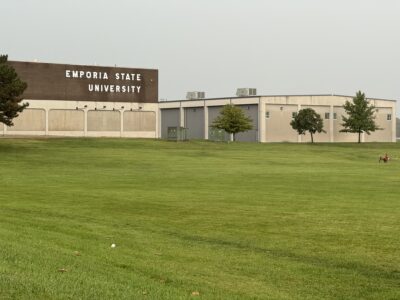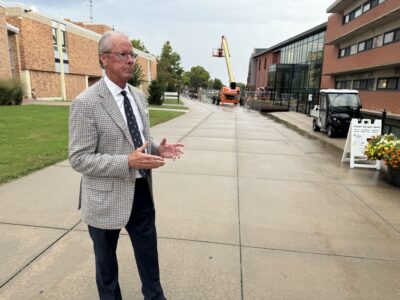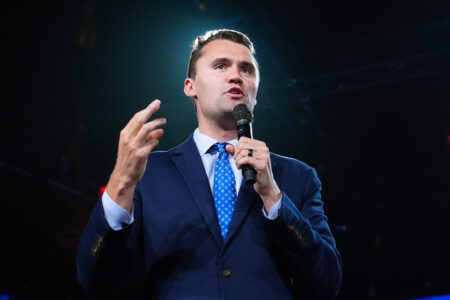Brownback defends gun laws, says tax plan is working

Gov. Sam Brownback answers questions during a year-end, sit-down interview on Dec. 8, 2015, in his office at the Statehouse in Topeka.
Topeka ? Despite protests from students and university officials across the state, Gov. Sam Brownback is making no apologies for new gun laws that will soon require campuses to allow concealed weapons on campuses.
Nor is he giving any indication that he’s prepared to back down.
“It’s a Second Amendment right,” Brownback said during a recent interview. “Some people would look at some things I suppose under any constitutional right and question it, but it remains a constitutional right.”

Gov. Sam Brownback answers questions during a year-end, sit-down interview on Dec. 8, 2015, in his office at the Statehouse in Topeka.
In 2013, Kansas lawmakers passed and Brownback signed, a bill mandating that concealed weapons be allowed in nearly all public buildings unless adequate security is in place to prevent anyone from bringing in a weapon. Public colleges and universities were given until 2017 to come into compliance with that law.
In April this year, Brownback and the Legislature went even further, approving a bill authorizing people to carry concealed weapons without a permit or any mandatory gun safety training, provided they are not otherwise legally prohibited from owning a firearm.
Kansas University Chancellor Bernadette Gray-Little and 70 KU distinguished professors have publicly spoken out against the new law, as have faculty at Kansas State University and other institutions.
Meanwhile, the Kansas Board of Regents recently began drafting formal policies for how schools under its purview are to carry out the new law.
Brownback, however, said he does not believe imposing restrictions on gun rights improves public safety, citing the recent mass shooting in San Bernadino, Calif., as an example.
“California had a whole series of them in place,” he said. “I think that’s people’s question. You get a situation like California that does have a series of limitations on gun rights, and you still have difficult situations that happen there.”
Taxes and the economy
Brownback spoke during a one-on-one interview with the Journal-World, one in a series of year-end interviews that governors traditionally grant to members of the Statehouse press corps.
Heading into his sixth year as governor, Brownback has been plagued by a sluggish state economy, budget shortfalls that many critics say are the result of his controversial tax policies, and low approval ratings.
After barely surviving his re-election bid in 2014 — he won with less than 50 percent of the vote — a recent national poll by the political website Morning Consult rated him as the least popular governor in the United States, with only 26 percent of voters polled saying they approve of the job he is doing.
Brownback, however, said he senses things are starting to turn around, pointing to a month of good economic news in November showing unemployment going down and state revenues starting to rebound.
“I feel good. The tax plan is working,” he said.
“Three of our bigs (economic indicators) are down: oil and gas is down; ag is down; and small jets, small planes are down,” he said. “Normally for us, when three of your bigs are down, your unemployment rate is up. We’re at a 14-year low on our unemployment rate. So that part’s really been good. We’ve got record small business growth, a big migration of money from Missouri into Kansas. We’ve got really nice small business growth and wage growth.”
He conceded, however, that there is one important trend that could spell trouble for the state in the future: a shrinking labor force, due in part to young people leaving Kansas to find opportunities elsewhere.
“That could restrain our growth, if we don’t get (population) growth,” he said. “We did have in-migration in 2014, finally for the first time in five or seven years. We just need more people. We need more in-migration. My hope is, if you can get wage growth happening, then it’s worth more to move (to Kansas). And that’s what we need to have.”
The one thing he said he does not want to consider is any retreat from his tax policies.
“The tax plan is working,” he said. “I hope we don’t have a tax policy debate during this legislative session.”
2016 session
Looking ahead to the next legislative session, which begins Jan. 11, Brownback said he hopes to make progress on several issues, including water policy and reducing the state’s poverty rate, although he offered no specifics about bills he plans to introduce.
But one of the overriding issues, he said, will be the issue that has dominated most legislative sessions for the past 20 years: school finance.
“I think we need to really start looking at the long-term school funding formula and school financing to get more money into the classroom,” he said.
During the 2015 session, at Brownback’s urging, lawmakers repealed the old school finance formula, which sent money to each district on a per-pupil basis, and replaced it with a system of block grants while lawmakers work to devise a new formula.
But a three-judge panel in Shawnee County struck down that move as unconstitutional, and the state is now appealing that decision to the Kansas Supreme Court. Much of how the 2016 session goes, Brownback said, will depend on how the court responds in that case.
“It shouldn’t be anything like last legislative session,” he said, referring to the record-breaking 114-day session in 2015. “But, you don’t know what the court may order and what wild cards are still to come in. If that comes in the middle of the session, you just don’t know what will happen to the session.”
Medicaid expansion
Another issue likely to come up in 2016 is whether the state should expand its Medicaid program, officially known as KanCare, as allowed under the federal Affordable Care Act.
A number of Republican lawmakers have said Medicaid expansion could have passed the House in 2015, but GOP leaders in the House would not allow a debate on it, and many believed Brownback would have vetoed any such bill, even if it did pass both chambers.
Brownback, however, denied that he issued any kind of blanket veto threat. But he said he will only consider such a plan under certain strict conditions, starting with eliminating the already-existing waiting list for elderly and disabled Medicaid patients to receive nonmedical home- and community-based services.
“I want to take care of the wait list first, because these are people who have physical or mental disabilities that we’re not providing the full set of services to,” Brownback said. “Before we go to able-bodied (individuals), we should pay for the full set of services for these individuals.”
In addition, Brownback said any plan for expanding Medicaid must be fully funded, and it must include a work requirement for able-bodied adults.
“We’ve got to meet these conditions first,” he said. “But I think most Kansas would say that makes sense. We should do those things first. So if they come up with ways to fund that, good, let’s try it.”






